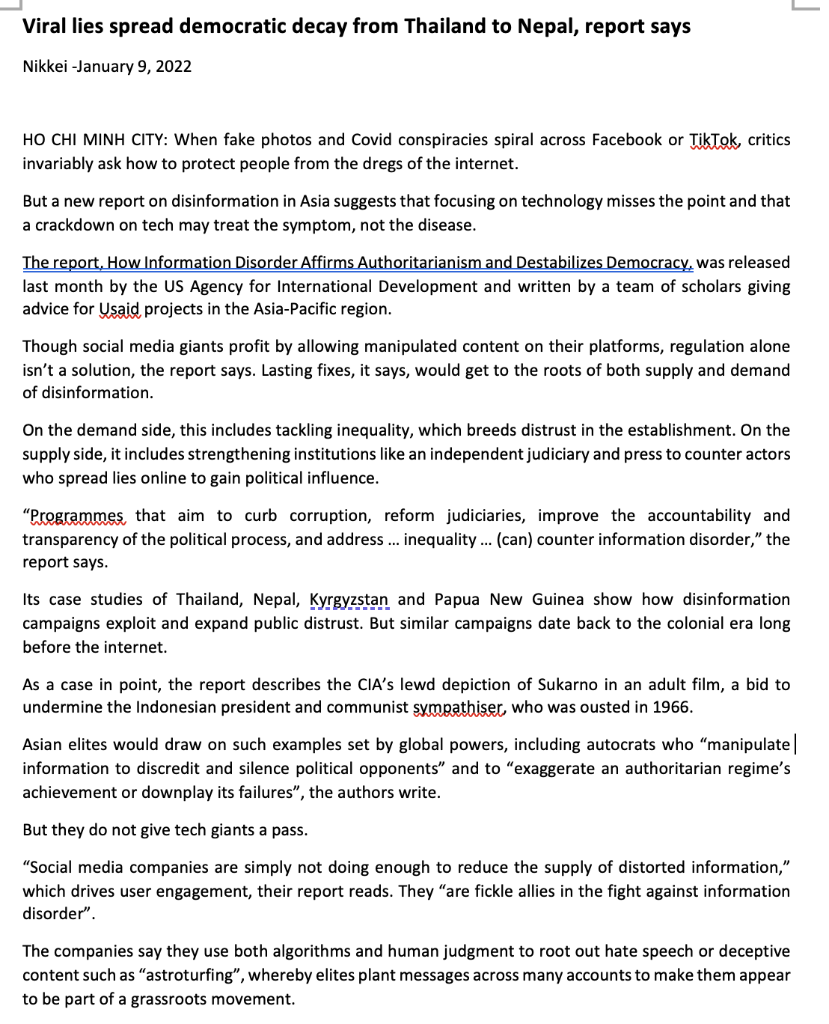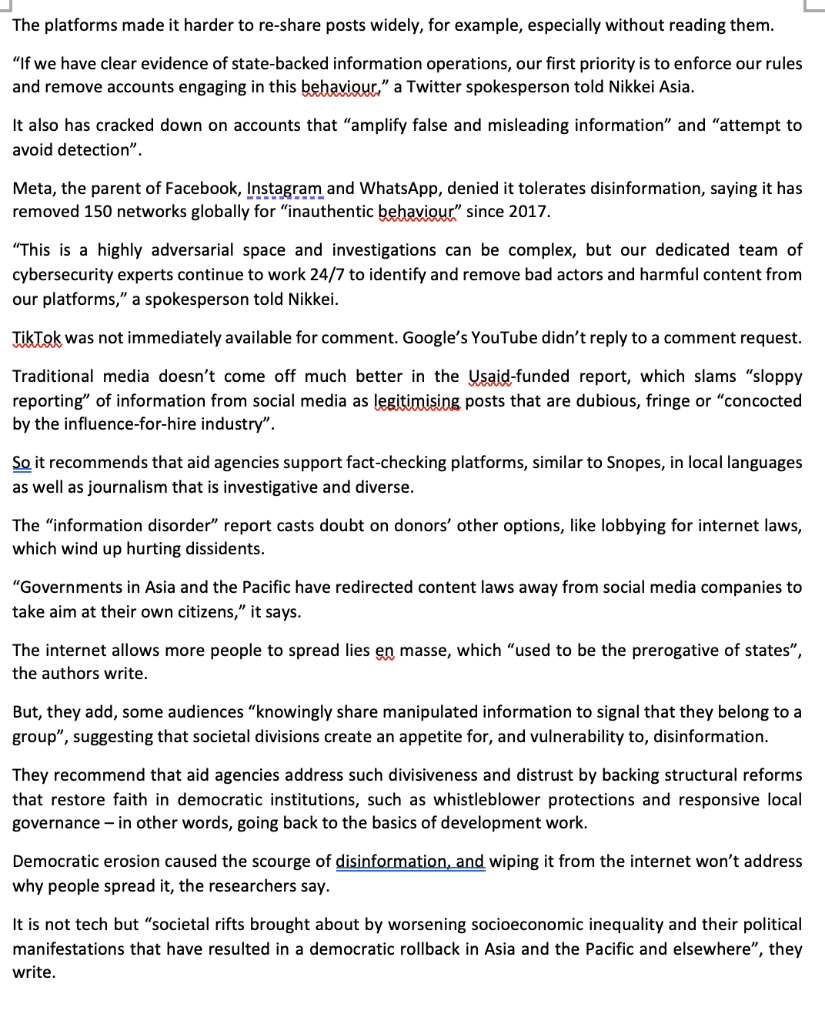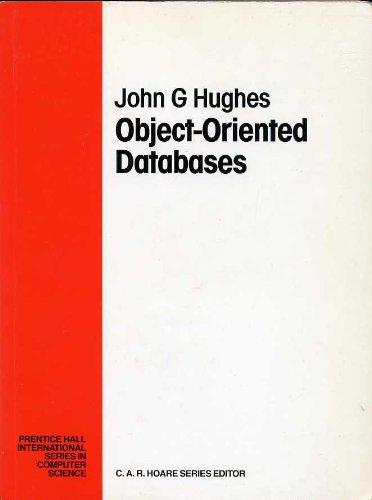- How to counter fake news on the demand side?
- How to counter fake news on the supply side?
- List the country where CIA attempted to spear the President.
Please read the following passage to answer the questions.


L Viral lies spread democratic decay from Thailand to Nepal, report says Nikkei - January 9, 2022 HO CHI MINH CITY: When fake photos and Covid conspiracies spiral across Facebook or TikTok, critics invariably ask how to protect people from the dregs of the internet. But a new report on disinformation in Asia suggests that focusing on technology misses the point and that a crackdown on tech may treat the symptom, not the disease. The report, How Information Disorder Affirms Authoritarianism and Destabilizes Democracy, was released last month by the US Agency for International Development and written by a team of scholars giving advice for Usaid projects in the Asia-Pacific region. Though social media giants profit by allowing manipulated content on their platforms, regulation alone isn't a solution, the report says. Lasting fixes, it says, would get to the roots of both supply and demand of disinformation. On the demand side, this includes tackling inequality, which breeds distrust in the establishment. On the supply side, it includes strengthening institutions like an independent judiciary and press to counter actors who spread lies online to gain political influence. "Programmes, that aim to curb corruption, reform judiciaries, improve the accountability and transparency of the political process, and address ... inequality ... (can) counter information disorder," the report says. Its case studies of Thailand, Nepal, Kyrgyzstan and Papua New Guinea show how disinformation campaigns exploit and expand public distrust. But similar campaigns date back to the colonial era long before the internet. As a case in point, the report describes the CIA's lewd depiction of Sukarno in an adult film, a bid to undermine the Indonesian president and communist sympathiser, who was ousted in 1966. Asian elites would draw on such examples set by global powers, including autocrats who manipulate| information to discredit and silence political opponents and to "exaggerate an authoritarian regime's achievement or downplay its failures", the authors write. But they do not give tech giants a pass. "Social media companies are simply not doing enough to reduce the supply of distorted information," which drives user engagement, their report reads. They "are fickle allies in the fight against information disorder". The companies say they use both algorithms and human judgment to root out hate speech or deceptive content such as astroturfing", whereby elites plant messages across many accounts to make them appear to be part of a grassroots movement. The platforms made it harder to re-share posts widely, for example, especially without reading them. "If we have clear evidence of state-backed information operations, our first priority is to enforce our rules and remove accounts engaging in this behaviour," a Twitter spokesperson told Nikkei Asia. It also has cracked down on accounts that "amplify false and misleading information" and "attempt to avoid detection". Meta, the parent of Facebook, Instagram and WhatsApp, denied it tolerates disinformation, saying it has removed 150 networks globally for "inauthentic behaviour" since 2017. "This is a highly adversarial space and investigations can be complex, but our dedicated team of cybersecurity experts continue to work 24/7 to identify and remove bad actors and harmful content from our platforms," a spokesperson told Nikkei. TikTok was not immediately available for comment. Google's YouTube didn't reply to a comment request. Traditional media doesn't come off much better in the Usaid-funded report, which slams sloppy reporting" of information from social media as legitimising posts that are dubious, fringe or "concocted by the influence-for-hire industry". Snopes, in local languages So it recommends that aid agencies support fact-checking platforms, similar as well as journalism that is investigative and diverse. The "information disorder report casts doubt on donors' other options, like lobbying for internet laws, which wind up hurting dissidents. "Governments in Asia and the Pacific have redirected content laws away from social media companies to take aim at their own citizens," it says. The internet allows more people to spread lies en masse, which "used to be the prerogative of states", the authors write. But, they add, some audiences "knowingly share manipulated information to signal that they belong to a group", suggesting that societal divisions create an appetite for, and vulnerability to, disinformation. They recommend that aid agencies address such divisiveness and distrust by backing structural reforms that restore faith in democratic institutions, such as whistleblower protections and responsive local governance - in other words, going back to the basics of development work. Democratic erosion caused the scourge of disinformation, and wiping it from the internet won't address why people spread it, the researchers say. It is not tech but "societal rifts brought about by worsening socioeconomic inequality and their political manifestations that have resulted in a democratic rollback in Asia and the Pacific and elsewhere", they write








